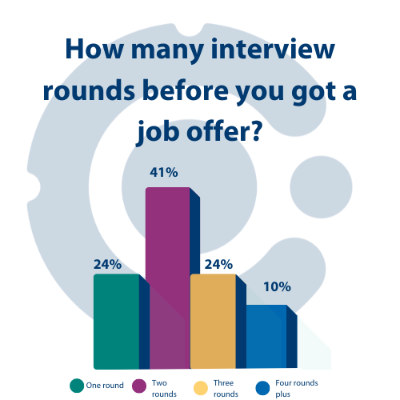In the dynamic Irish job market, a common question from both job seekers and employers is: "How many interview rounds lead to a job offer?" To shed light on this, we surveyed over 100 individuals who recently received job offers. The findings provide insightful and interesting perspectives on what can be considered the acceptable standard.

Results of the poll
Most respondents secured their job after two interview rounds. However, there were a few standout reasons for differentiation in interview rounds. We look at the poll results and the reasoning behind them.
One interview round
24% of poll participants received a job offer after just one interview. This group predominantly consisted of candidates making lateral career transitions (not moving up ‘the ladder’) with many of them in contract or temporary positions.
Two interview rounds
The majority, representing 41% of respondents, secured a job offer after two interview rounds. Two rounds seem to work well for both candidates and employers, with both parties gaining a good sense of their prospective future. This trend was particularly noticeable among professional contractors.
Three interview rounds
24% of respondents navigated through three interview rounds before receiving a job offer. Based on conversations with candidates, it's common for one of the three rounds to be a pre-phone screening or a final informal discussion, making the three-round interview process less intensive than it might initially appear. A three-round process is more typically associated with permanent positions.
Four interview rounds
10% of candidates reported undergoing four rounds of interviews. The occurrence of five or more rounds was even less common, with only a small number of participants indicating they had experienced such extensive processes.
The scenario of four or more interview rounds is more prevalent in highly process-oriented and compliance-intensive sectors such as finance, legal, and public service. Candidates in these areas can face stringent selection processes where multiple stages are deemed "necessary" for comprehensive assessment, and decision-making requires several layers of approval. Candidates should be well-prepared beforehand if they encounter a company that conducts such extensive interviews to avoid withdrawing mid-process.
If an organisation typically operates a four plus round process, they should communicate this clearly from the outset, outlining each round and its focus. Providing comprehensive feedback should be a standard practice in any interview process, but it becomes even more critical in processes involving four or more interview rounds.
When analysing the poll results, we discovered several insights that, while seemingly evident, provide valuable perspective on the job market and the interview process.
Industry Factors
The number of interview rounds can often vary depending on the industry or sector of the job. Notably, sectors like finance, consulting, and technology are recognised for conducting more comprehensive interview processes. These may extend over multiple rounds to thoroughly assess both the technical proficiency and cultural alignment of the candidates.
Company Culture
The number of interview rounds can also occasionally reflect a company's culture and values. For instance, organisations that prioritise teamwork and collaboration may conduct multiple interview rounds to evaluate a candidate's compatibility with the team. They might even include existing team members in the interview process to observe the dynamics between them and prospective candidates.
Competition
The degree of competition for a specific role can influence the number of interview rounds. For highly coveted positions, employers may implement extra rounds of interviews to ensure they are selecting the most suitable candidate.
Contract Type
The nature of interview processes can often be influenced by the type of contract being offered. Whether it's a daily rate contract position, a fixed-term contract, or a temporary contract, each may entail a different interview process compared to that of a permanent opening.
Conclusion
The number of interview rounds necessary to obtain a job offer can differ greatly for various reasons. The poll results show the diversity of viewpoints and preferences among today's job seekers. Some candidates favour quick and efficient interviews and feedback, while others appreciate a more thorough evaluation process. It's clear that there isn't a universal approach to hiring that suits every situation.
Ace your next interview with our Candidate Directory.
